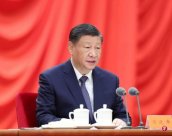The People's Bank of China held a seminar with several well -known economists in China to discuss issues such as dredging monetary policy transmission mechanisms and preventing and resolving financial risks.
According to the press release issued on Wednesday (January 10) of the Central Bank of China on the official website, Lu Lei, the vice president of the Central Bank of China, attended the seminar. The experts of the participating experts including Zhu Baoliang, the chief economist of the National Information Center, and Li Li, the former central bank consultant,Wu Ge, chief economist of Changjiang Securities, etc.
The press release states that the participating experts raised issues such as the coordination of monetary policy transmission, strengthening monetary policy and other policy coordination, improving the quality and efficiency of financial services, better guiding market expectations, preventing and resolving financial risks and other issues.Constructive opinions and suggestions.The People's Bank of China did not mention the specific date of the seminar.
Lu Lei said at the meeting that the central bank has always attached great importance to theoretical research work, pays attention to the wisdom of experts and scholars, and sincerely hope that the participating experts will speak freely, establish a modern central bank system, build a scientific and stable financial regulation system, Deepen the structural reform of the financial supply side, coordinate financial opening and security, and steadily expand the relevant issues of institutional opening up in the financial sector.
Bloomberg reports that the actual cost of borrowing in China has soared, and due to the continuous contraction pressure, the actual interest rate is expected to remain high this year, which constitutes another major threat to economic growth.
At the same time, credit demand is still weak, although the central bank has worked hard to relax monetary policy.The downturn in the real estate market for several years inhibits investment in many industries related to the property market.In the case of weak employment market, consumers are also holding their wallets.This allows liquidity to only circulate within the financial system, rather than investing in activities that are more favorable for economic growth.


